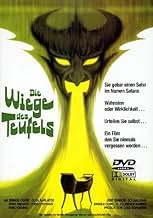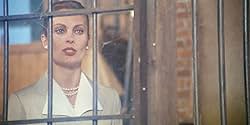Ajouter une intrigue dans votre langueA blind boy, who lives alone with his mean sister in a rundown hotel in Venice, receives a vision that warns him of the upcoming birth of the Antichrist. Soon, his sister mysteriously become... Tout lireA blind boy, who lives alone with his mean sister in a rundown hotel in Venice, receives a vision that warns him of the upcoming birth of the Antichrist. Soon, his sister mysteriously becomes pregnant.A blind boy, who lives alone with his mean sister in a rundown hotel in Venice, receives a vision that warns him of the upcoming birth of the Antichrist. Soon, his sister mysteriously becomes pregnant.
- Réalisation
- Scénario
- Casting principal
Avis à la une
The is is a fairly obscure and poorly distributed movie from 1977/78 that actually packs quite a punch. The fact there are only (at time of writing ) EIGHT reviews on IMDb proves how little seen it is. Now that I have watched it, I want everybody to know how good it is.
OK, it's no masterpiece but for any fan of 1970's -1980's European giallos and shockers it is bound to prove very enjoyable. That's not to say it is a giallo, although it is filmed like one, but the plot is more supernatural. Something along the lines of The Omen, the plot involves a brother and sister who live in Venice and due to a few unexpected events find themselves inheriting a boarding house. Mysterious bad omens wash over them and eventually the brother starts so suspect that evil forces are preying on them, but why? First of all I want to point out the setting of the film, which is very clearly shot on location in Venice, and it looks terrific. The boarding house has window views over the main waterway of the city and many outside scenes are shot in the city centre. It makes a difference! Secondly, the whole film has a recognisable Italian slant, particularly in the way religion is portrayed, and in a way that roots it well and truly in it's time frame of the 1970's, it is full of period and localization chic in my mind.
Next, all the performances are good. Although I watched the film in Italian with English subtitles it was still dubbed by the looks of things, but this did not matter. The performances are great, especially of the brother of the two main characters, who is blind and yet afflicted with gruesome visions of supernatural events and violence. He brings a naturalness to the role that make it very believable. The sister is pretty good too, although a less likable character, so her colder performance kind of fits the role.
There is a fair amount of violence, and some scenes do stand out, especially for a film made this in period. Most of the time, the younger brother's visions are a cue for something horrific to happen on camera, and this includes several nasty piercings of unfortunate people with nails and/or the end of a very sharp cane. There's also the discovery of a very effective rotting corpse which is quite revolting. Most people who have watched the movie, however, come away from it holding the memory of one single shocking scene involving a tiny baby which even had me gasping - you'll know it when you see it! Don't worry it doesn't look real but it would be unheard of in a British or American movie of the time, or even now I suspect.
However, one brief scene of shock would not be enough to make me recommend a movie (in the same way that the scene with the animated poker in "Patrick Viva Encore" didn't make me recommend that to anyone), but Nero Venezia would still be effective anyway. It really does have a sense of atmosphere, and although a lot of the plot is glossed over with a better script it could have really created a true atmosphere of corruption. Still worth a look if you can find it.
OK, it's no masterpiece but for any fan of 1970's -1980's European giallos and shockers it is bound to prove very enjoyable. That's not to say it is a giallo, although it is filmed like one, but the plot is more supernatural. Something along the lines of The Omen, the plot involves a brother and sister who live in Venice and due to a few unexpected events find themselves inheriting a boarding house. Mysterious bad omens wash over them and eventually the brother starts so suspect that evil forces are preying on them, but why? First of all I want to point out the setting of the film, which is very clearly shot on location in Venice, and it looks terrific. The boarding house has window views over the main waterway of the city and many outside scenes are shot in the city centre. It makes a difference! Secondly, the whole film has a recognisable Italian slant, particularly in the way religion is portrayed, and in a way that roots it well and truly in it's time frame of the 1970's, it is full of period and localization chic in my mind.
Next, all the performances are good. Although I watched the film in Italian with English subtitles it was still dubbed by the looks of things, but this did not matter. The performances are great, especially of the brother of the two main characters, who is blind and yet afflicted with gruesome visions of supernatural events and violence. He brings a naturalness to the role that make it very believable. The sister is pretty good too, although a less likable character, so her colder performance kind of fits the role.
There is a fair amount of violence, and some scenes do stand out, especially for a film made this in period. Most of the time, the younger brother's visions are a cue for something horrific to happen on camera, and this includes several nasty piercings of unfortunate people with nails and/or the end of a very sharp cane. There's also the discovery of a very effective rotting corpse which is quite revolting. Most people who have watched the movie, however, come away from it holding the memory of one single shocking scene involving a tiny baby which even had me gasping - you'll know it when you see it! Don't worry it doesn't look real but it would be unheard of in a British or American movie of the time, or even now I suspect.
However, one brief scene of shock would not be enough to make me recommend a movie (in the same way that the scene with the animated poker in "Patrick Viva Encore" didn't make me recommend that to anyone), but Nero Venezia would still be effective anyway. It really does have a sense of atmosphere, and although a lot of the plot is glossed over with a better script it could have really created a true atmosphere of corruption. Still worth a look if you can find it.
Nero veneziano is a bleak, unsettling descent into metaphysical horror, cloaked in the rotting beauty of Venice. The film's strongest asset is its heavy, almost oppressive atmosphere, which seeps into every frame like rising damp. The cinematography captures this decay with lingering shots of crumbling architecture, dim candlelit interiors, and the cold stillness of the canals, evoking a dreamlike but suffocating sense of dread. Cinematographer Vittorio Storaro's signature use of chiaroscuro and tinted color palettes (though less flamboyant here than in his later works) helps to ground the film in both realism and symbolic unease. That said, the narrative pacing often struggles under the weight of its imagery; the film indulges in visual mood at the expense of narrative momentum.
Among the cast, Rena Niehaus delivers a quietly gripping performance, her expressive face managing to convey vulnerability and unease without relying on melodrama. Ely Galleani, in a more ephemeral role, radiates a hypnotic presence that fits the film's tone even if her character feels underwritten. Luciano Virgilio, playing the lead, captures the physical and psychological decline demanded of him, but at times his delivery flattens under the script's cryptic weight. The erotic elements, including full nudity from both Niehaus and Galleani, are photographed in a subdued, non-gratuitous manner, blending seamlessly into the film's themes of mortality, vision, and corrupted innocence. However, the film's art-house ambitions often clash with its pulpy occult trappings, creating an awkward tonal imbalance that keeps it from fully succeeding in either realm.
A blind teenage boy is sent to Venice to recover from illness, only to become the focal point of a prophetic nightmare as visions of death and plague begin to merge with reality. His parents, both uneasy and secretive, struggle to understand the dark forces closing in, while the ancient city itself becomes a labyrinth of omens, shadows, and half-truths.
Among the cast, Rena Niehaus delivers a quietly gripping performance, her expressive face managing to convey vulnerability and unease without relying on melodrama. Ely Galleani, in a more ephemeral role, radiates a hypnotic presence that fits the film's tone even if her character feels underwritten. Luciano Virgilio, playing the lead, captures the physical and psychological decline demanded of him, but at times his delivery flattens under the script's cryptic weight. The erotic elements, including full nudity from both Niehaus and Galleani, are photographed in a subdued, non-gratuitous manner, blending seamlessly into the film's themes of mortality, vision, and corrupted innocence. However, the film's art-house ambitions often clash with its pulpy occult trappings, creating an awkward tonal imbalance that keeps it from fully succeeding in either realm.
A blind teenage boy is sent to Venice to recover from illness, only to become the focal point of a prophetic nightmare as visions of death and plague begin to merge with reality. His parents, both uneasy and secretive, struggle to understand the dark forces closing in, while the ancient city itself becomes a labyrinth of omens, shadows, and half-truths.
Other than for the Venice scenarios, this late Rosemary's baby clone is almost dismissable without any comment, with its story of a blind young man trying to battle against the evil spawn of his sister short relation (in fact, she was virgin, as Satan want to mock Jesus life and death for his son)with a dark stranger, probably Satan himself. Bad acting, bad story, bad special effects, gratuitous nudity. A real B-movie, but not as good as it should be
Mark is a blind boy living with his sister Christine in Venice.During a funeral Mark has another in a series of recent visions of a man with a cane,only this time the man is with a woman and a dog that is eating a decayed arm.Christine is openly unsympathetic to these visions and resents having to look after her brother.Mark and Christine are orphans and are staying with their grandmother,but when grandmother is killed in a bizarre fire accident their mother's family,the mysterious Winters become their guardians and Mark and Christine go to stay at their house."Damned in Venice" is a neglected gem.It offers some genuine shocks and a nice amount of female nudity.The Venetian location sets are gloomy,decayed and oppressive and there is a bit of gore including pretty nasty scene of child murder.It's great to see Lorraine DeSelle and Olga Karlatos of "Zombi 2" fame in the small roles.8 out of 10.
Directed by Ugo Liberatore (who co-scripted Giorgio Ferroni's fantastic 1960 Gothic Horror film "Il Mulino Delle Donne Di Pietro" aka "The Mill of the Stone Women"), "Nero Veneziano" of 1978 is an elegant, creepy and bizarre occult flick which is sometimes unfairly called a 'rip off' of American films like "Rosemary's Baby" and "The Omen". This only makes sense if any film that has to do with the Antichrist released after the aforementioned films is automatically a rip-off (in which case one would also have to argue that all American Slashers are rip-offs of Italian Gialli like Bava's "Bay of Blood"). "Nero Veneziano", in my opinion, is not a rip-off. Also, some people seem to regard this film as a Giallo, which astonishes me since it simply isn't at all: There is no murder series or murder mystery here, but occult and supernatural Horror - Which makes it anything but a Giallo. While it is a worthwhile and elegant film it isn't a masterpiece either, as whereas the visual style is wonderful and the film's bizarre nature is fascinating, the flick also isn't too coherent, and it occasionally becomes a little lengthy in-between. Still, it is a compelling experience which my fellow fans of Italian Horror should not miss.
"Nero Veneziano" is terrifically set in Venice, which contributes a lot to the film's visual beauty. Mark (Renato Cestiè), a boy who has been blind for the last three years, is tormented by occasional gruesome and infernal visions. When the orphaned boy and his older sister Christine (Rena Niehaus) also loose their grandmother in a tragic event, Mark's disturbing visions turn out to be more than bizarre nightmares...
The film is visually beautiful and impressive, though the whole thing is bleak and the colors are kept very cold. Actually, the visual style somewhat reminded me of Pupi Avati's brilliant "La Casa Delle Finesetre Che Ridono" ("The House with the Laughing Windows"), though Avati's film is set in the countryside, and furthermore a masterpiece, which this film isn't in my opinion. Still the story is fascinating, though it has its holes. The film is rather slow-going, but includes a bunch of truly disturbing outbursts, such as Mark's violent visions. Leading actor Renato Cestiè, who was 15 when this film was made, is best known for playing child roles in older genre gems, such as Mario Bava's "Reazione a Catena" ("A Bay of Blood", 1971) and Sergio Martino's "I Corpi Presentano Tracce Di Violenzia Carnale" ("Torso", 1973). Rena Niehaus, who plays the female lead, might also be known to fans of Italian Exploitation/Cult cinema for starring in Epinardo Visconti's "La Orca" (1976) and the sequel "Oedipus Orca" (1977). Overall, this is a creepy and atmospheric occult horror film that is especially recommendable due to its elegant visual style and bizarre mood. Recommended.
"Nero Veneziano" is terrifically set in Venice, which contributes a lot to the film's visual beauty. Mark (Renato Cestiè), a boy who has been blind for the last three years, is tormented by occasional gruesome and infernal visions. When the orphaned boy and his older sister Christine (Rena Niehaus) also loose their grandmother in a tragic event, Mark's disturbing visions turn out to be more than bizarre nightmares...
The film is visually beautiful and impressive, though the whole thing is bleak and the colors are kept very cold. Actually, the visual style somewhat reminded me of Pupi Avati's brilliant "La Casa Delle Finesetre Che Ridono" ("The House with the Laughing Windows"), though Avati's film is set in the countryside, and furthermore a masterpiece, which this film isn't in my opinion. Still the story is fascinating, though it has its holes. The film is rather slow-going, but includes a bunch of truly disturbing outbursts, such as Mark's violent visions. Leading actor Renato Cestiè, who was 15 when this film was made, is best known for playing child roles in older genre gems, such as Mario Bava's "Reazione a Catena" ("A Bay of Blood", 1971) and Sergio Martino's "I Corpi Presentano Tracce Di Violenzia Carnale" ("Torso", 1973). Rena Niehaus, who plays the female lead, might also be known to fans of Italian Exploitation/Cult cinema for starring in Epinardo Visconti's "La Orca" (1976) and the sequel "Oedipus Orca" (1977). Overall, this is a creepy and atmospheric occult horror film that is especially recommendable due to its elegant visual style and bizarre mood. Recommended.
Meilleurs choix
Connectez-vous pour évaluer et suivre la liste de favoris afin de recevoir des recommandations personnalisées
- How long is Damned in Venice?Alimenté par Alexa
Détails
Contribuer à cette page
Suggérer une modification ou ajouter du contenu manquant

























